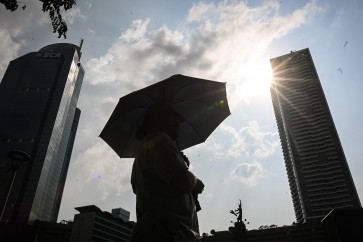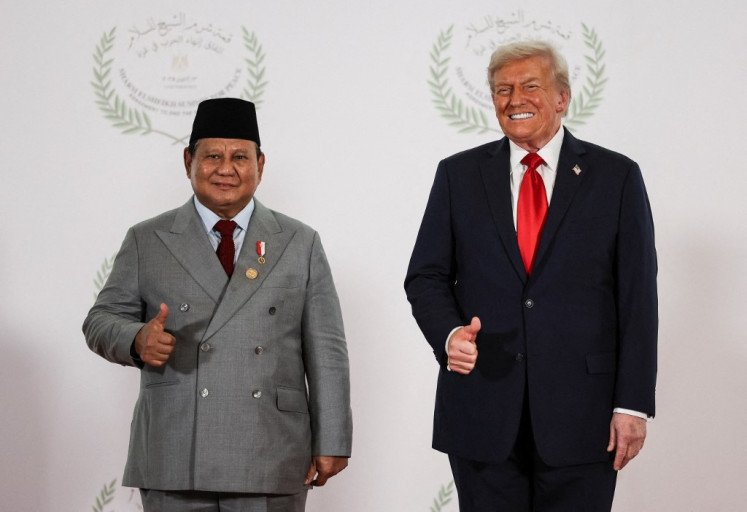Popular Reads
Top Results
Can't find what you're looking for?
View all search resultsPopular Reads
Top Results
Can't find what you're looking for?
View all search resultsLegal glitch derails icon of industry reform
With upstream oil and gas regulator BPMigas declared obsolete by the Supreme Court on Tuesday, the former head of the now defunct institution, Raden Priyono, mourns the demise of what he considers one of Indonesia’s reform icons after the fall of Soeharto’s autocratic rule in 1998
Change text size
Gift Premium Articles
to Anyone
W
/span>With upstream oil and gas regulator BPMigas declared obsolete by the Supreme Court on Tuesday, the former head of the now defunct institution, Raden Priyono, mourns the demise of what he considers one of Indonesia’s reform icons after the fall of Soeharto’s autocratic rule in 1998.
The founding of the so-called implementing body for oil and gas regulations in July 2002 was meant as a corner stone for prudence and to help avoid the potential abuse of power and corruption that characterized the management of the industry, Priyono said.
Under the 2001 law on oil and gas, BPMigas took over the regulatory power of the industry from state-owned oil and gas company PT Pertamina, which under Soeharto’s rule enjoyed a dual function as oil and gas operator as well as the administrator of the industry, with the right to issue regulations and operating licenses.
The special rights led to rampant abuse of power and corruption in the management of the industry by Pertamina, which at that time was under the heavy influence of the military and Soeharto’s cronies.
“We are in fact an embodiment of reform as many people under the Soeharto era were already disappointed with Pertamina, which was so debt-ridden. The debts were worth three times the government’s debts,” Priyono told reporters in one occasion.
Priyono pointed out that Pertamina was so powerful under the New Order regime that no agencies were allowed to perform an audit on its financial management. BPMigas was formed to revive the check and balance system on the industry, he said.
Under BPMigas, he said, the supervision on oil and gas cost recovery reimbursement — a compensation given to oil and gas operators for explorations — had become very strict, with no expenses outside operation activities covered by the government.
As many as 302 oil and gas contractors currently operate in Indonesia under the supervision of BPMigas, with 67 of them having reached production stages. So far, Indonesia’s oil and gas output has reached 2.36 million barrel oil equivalent per day as of September, a slight decrease from 2.4 million last year.
Another reform milestone in the oil and gas industry was made in 2009 when BPMigas demanded oil and gas operators to source 35 percent of its goods and services procurement from the domestic market. The domestic quota was raised in 2011 to 51 percent. Before the local-content ruling, Priyono said, contractors spent an average of 20 percent of annual spending domestically. Total expenditures in the oil and gas sector is worth between
Rp 110 trillion (US$11.46 billion) and Rp 150 trillion annually, he added.
BPMigas is also credited for helping to strengthen the rupiah in 2008 when the economy was dealing with the global economic crisis by demanding oil and gas contractors to place their cash in domestic banks.
Despite numerous reforms efforts made by BPMigas, oil and gas experts have blamed the institution for failure to raise the country’s oil and gas output.
Indonesia, a former member of the Organization of the Petroleum Exporting Countries (OPEC), became a net oil importer three years ago. Indonesia’s oil output declined to 871,000 barrels per day (bpd) in 2012, which was below the government’s target of 930,000 bpd.
BPMigas has also been accused, mostly by activists, of lacking nationalism for not granting oil and gas contracts that had reached expiration to Pertamina. One case in point is the transfer of control over the Mahakam oil and gas block in East Kalimantan, which is currently jointly held by a French company Total E&P Indonesie and Japan’s Inpex.
Since the contract for Total and Inpex will expire in 2017, the government is required to decide on what will happen to the block. BPMigas insisted that the involvement of the foreign companies in the block was crucial to ensure a healthy level of production output.
Activists prefer Pertamina to take over the block, using their “lack of nationalism” accusation as one argument in a judicial review filed against the legality of BPMigas to the Supreme Court.
The Court ruled in favor of the activists on Tuesday, denouncing the existence of BPMigas, which employed 866 workers.










